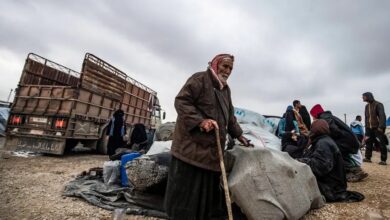Saudi Arabia Welcomes Assad in Diplomatic Win for Syrian Leader
Syrian President Bashar Al Assad touched down in Saudi Arabia to attend an Arab League summit for the first time in 13 years, marking a victory for a leader sanctioned by the US for war atrocities.

Assad arrived in Jeddah late Thursday, the state-run Saudi Press Agency said. He’d accepted a formal invitation from King Salman Bin Abdulaziz following the Arab League’s decision to reinstate Syria in the 22-member regional body earlier this month.
It’s a personal triumph for the 57-year-old, who a decade ago spurned the League’s mediation efforts to prevent his army crushing largely peaceful protests during the Arab Spring uprisings.
Later, Saudi Arabia joined a broad coalition of regional and Western states supporting Syrian rebels and opposition groups seeking to defeat Assad as the conflict morphed into a full-blown war. The fighting has killed at least 500,000 people, displaced half the pre-war population of 23 million, abetted the rise of extremist groups including Islamic State and fractured the country into zones under the sway of outside powers.
Assad’s also expected to attend the the COP28 climate-change meeting in the United Arab Emirates later this year.
One major reason for the change in Saudi Arabia’s approach is to persuade Assad to cooperate in curbing the flow of Captagon — an amphetamine drug fueling an addiction scourge among Saudi Arabia’s youth. The drug is made in Syria and smuggled through different routes to the rest of the region, and the US and UK have accused Assad’s relatives and associates of facilitating its manufacture and trade to earn revenue for the cash-strapped Syrian government.
Saudi Interior Minister Abdulaziz Bin Saud said Tuesday a “war on drugs” was just getting started and it’s being overseen by the country’s de facto ruler Crown Prince Mohammed bin Salman, who has been shifting policy to ensure regional troubles do not impact his grand economic transformation plans.
Sanctions Remain
The Saudi-led Arab embrace of Assad comes in sharp contrast to the heavy European and US sanctions that remain in place against the leader and his family, government and business associates for their central role in the war.
The US House Foreign Affairs Committee passed new legislation on Tuesday specifically focused on confronting diplomatic advances toward Syria led by countries such as Egypt and the UAE as well as Saudi Arabia. The UAE, which hosted Assad on an official visit in March, has invited him again to attend COP28 in Dubai.
While Assad has been propped up by Russia’s military presence in Syria since 2015 and has pivotal support from long-time ally Iran, he sees normalization of ties with Arab states — and specifically the region’s economic powerhouse Saudi Arabia — as a critical source of potential funding. The kingdom agreed to restore ties with Iran in a China-brokered deal in March.
“For Bashar and his supporters this is unequivocal victory for them and utter humiliation for their enemies,” said Mazen Darwish, a Paris-based Syrian human-rights activist and lawyer who was among the co-founders of the peaceful protest movement against the Assad government in 2011. He was imprisoned and tortured by Syrian security forces from 2012 until 2015.
“The regime is betting funds will flow from this rapprochement, especially from Saudi Arabia, even if it’s just enough to sustain its apparatus,” he said.
Economic losses from the Syrian conflict in the 2011-2019 period are estimated to have exceeded $442 billion, according to a 2020 UN study. The World Bank in March put the reconstruction and recovery cost of February’s earthquakes at $7.9 billion over three years. Meanwhile, the Syrian pound has collapsed and hyperinflation has sparked protests in areas that have largely remained neutral throughout the conflict.
Peace Chances
On a visit to Saudi Arabia earlier this week, Germany’s Foreign Minister Annalena Baerbock echoed the position of the US and many European states that any restoring of ties with Assad should be on condition he makes concessions tied to political reforms, prisoner releases and refugee returns, German media reported. More than one million asylum seekers arrived in Germany in 2015, the majority from Syria.
“It’s a huge let down, they are just sweeping all of Assad’s crimes under the carpet that they have rolled out to receive him,” said Joumana Seif, a Berlin-based Syrian lawyer involved in efforts to prosecute Syrian government figures for war crimes in German and European courts.
Bloomberg





